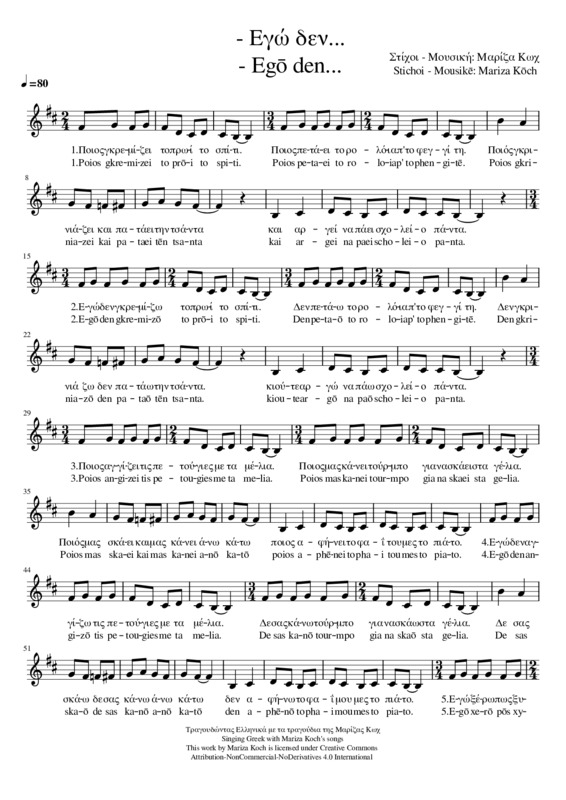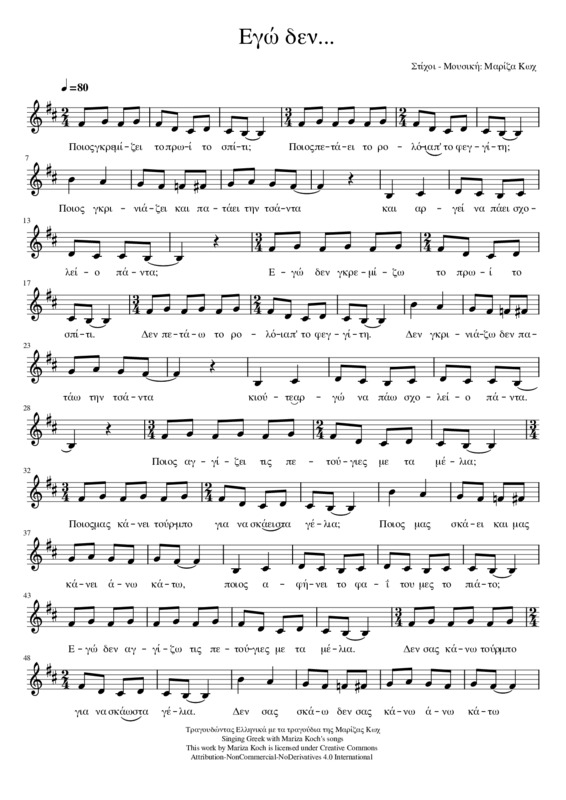
Poios gkremizei to prōi to spiti?

Poios gkremizei to prōi to spiti?
Pronunciation
Articulation of double consonants /γκ/ (/gk/ or /nk/, /gk/ when the consonants are found at the beginning or at the end of the word, and /nk/ when in the middle) and /γγ/ (/ng/) and practice them by articulating words containing these consonants [γκρεμίζει (gkremizei, he tears down), φεγγίτης (phengitēs, skylight), γκρινιάζει (gkriniazei, he grumbles), αγγίζω (angizō, to touch), αγγελούδι (angeloudi, little angel), αγκαλιά (ankalia, hug), καραγκιόζης (karankiozēs).
Speech Comprehension and Production
1st and 3rd person singular of simple present tense, active voice: γκρεμίζω - γκρεμίζει (gkremizō - gkremizei, I tear down - he tears down), αγγίζω - αγγίζει (angizō - angizei, I touch - he touches), γκρινιάζω - γκρινιάζει (gkriniazō - gkriniazei, I grumble - he grumbles), πετάω - πετάει (petaō - petaei, I throw - he throws), αργώ - αργεί (argō - argei, I am late - he is late), κάνω - κάνει (kanō - kanei, I make - he makes) etc.
Form interrogative sentences using the interrogative pronouns ποιος (poios, who), ποια (poia, who), ποιο (poio, which) and negative sentences using the function word δεν (den). Transform the poem into a dialogue and dramatize it, using the characters of the parents (1st and 3rd verse) and the child (2nd, 4th and 5th verse).
Oral expression: how pupils start their day, how they prepare for school (they can then write down the text).
Improvisations in everyday phrases according to the pattern of the song (i.e. Ποιος έφαγε όλο το φαγητό; Ποιος αργεί να ξυπνήσει; - Poios ephage olo to phagēto? Poios argei na xypnēsei? etc.).
Form interrogative sentences using the interrogative pronouns ποιος (poios, who), ποια (poia, who), ποιο (poio, which) and negative sentences using the function word δεν (den). Transform the poem into a dialogue and dramatize it, using the characters of the parents (1st and 3rd verse) and the child (2nd, 4th and 5th verse).
Oral expression: how pupils start their day, how they prepare for school (they can then write down the text).
Improvisations in everyday phrases according to the pattern of the song (i.e. Ποιος έφαγε όλο το φαγητό; Ποιος αργεί να ξυπνήσει; - Poios ephage olo to phagēto? Poios argei na xypnēsei? etc.).
Music Activities
Divide the class into two groups and perform the song with each group taking turns singing (group A: 1st, 3rd verse, group B: 2nd, 4th and 5th verse).
Use unpitched percussion instruments or body percussion to practice 2/4 and 3/4 times, so that the children get used to the change of the rhythm. Divide the class into two groups, who beat rhythmically and alternately in 2/4 and 3/4.
Listen to tracks in 2/4 and 3/4 where the children recognize the meter in each track. Listen to selected rempetika songs (by Markos Vamvakarēs, Vasilēs Tsitsanēs and others) and discuss their genre and style (preferably original versions).
Use unpitched percussion instruments or body percussion to practice 2/4 and 3/4 times, so that the children get used to the change of the rhythm. Divide the class into two groups, who beat rhythmically and alternately in 2/4 and 3/4.
Listen to tracks in 2/4 and 3/4 where the children recognize the meter in each track. Listen to selected rempetika songs (by Markos Vamvakarēs, Vasilēs Tsitsanēs and others) and discuss their genre and style (preferably original versions).
Cross-thematic Connections - Greek Culture
Interdisciplinary concepts: conflict, culture. Learn the history and the main instruments of rempetiko (bouzouki, baglamas, tzouras, etc.) with audiovisual material.
Make reference to the social profile of rempetiko singers as well as to the history of rempetiko, as it was formed during the first half of the 20th century on the margins of the urban culture.
Discuss how the creators of rempetiko contributed to the creation of the genre by combining traditional and urban musical forms, through their extreme attitude towards life and sometimes their delinquent behavior.
Make reference to the social profile of rempetiko singers as well as to the history of rempetiko, as it was formed during the first half of the 20th century on the margins of the urban culture.
Discuss how the creators of rempetiko contributed to the creation of the genre by combining traditional and urban musical forms, through their extreme attitude towards life and sometimes their delinquent behavior.
Age level
7-11 years old
11-15 years old
Language level
Intermediate
Family
Game
Unpublished





